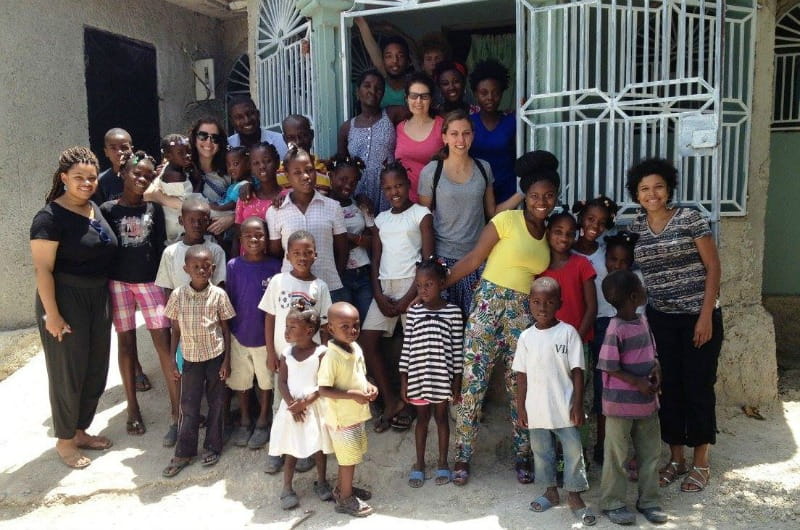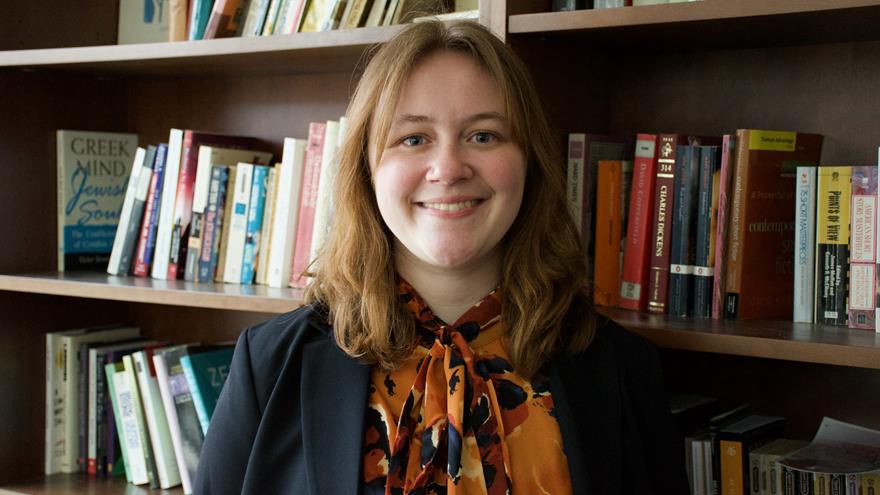Drexel’s Bond to Haiti Shown by Awards From Community Group
 By Ben Seal
By Ben Seal

Drexel's Harriet Levin Millan and Ahaji Schreffler at Love Orphanage in Haiti, where they have taken students to perform humanitarian work during study abroad courses.
The Haitian Coalition of Philadelphia recently honored three members of the Drexel community for their work building relationships between the local community and the island nation.
Ahaji Schreffler, associate director of Drexel’s Study Abroad Office, received the Honorary Haitian Citizen Award; Harriet Levin Millan, director of Drexel’s Certificate Program in Writing and Publishing and associate teaching professor in the College of Arts and Sciences, was honored with the Haitian Cultural Ambassador Award; and Shonta Collins, MSN ’13, a former adjunct professor in the College of Nursing and Health Professions, received the organization’s Humanitarian Award.
All three women have led Drexel students on study abroad courses in Haiti over the past five years for programs ranging from nursing to creative writing to education and development. For Schreffler, who started a nonprofit to help sustain and support a Haitian orphanage and worked with Collins on a clinical nursing program, the honor was particularly meaningful because of its source.
“For the Haitian community in Philadelphia to recognize what I’m doing, which is very grassroots, just means so much to me,” said Schreffler, “because ultimately it’s their country, their community.”
Schreffler began volunteering in Haiti in 2011, the year after the country experienced a catastrophic earthquake that killed more than 100,000 people. After connecting with Love Orphanage, a home for children in need, she later started We the Village, a nonprofit that raises funds, conducts outreach and provides educational opportunities for the children at the orphanage, all with the intent of uplifting its residents.
Schreffler’s first trip to Haiti was with Explorers San Frontières, a health care-focused humanitarian organization that Collins founded. The two Dragons then collaborated on a study abroad nursing program for Drexel graduate students, sending six cohorts down between 2012 and 2014.
Millan’s experience in Haiti also began shortly after the earthquake, when she brought Haitian author Beaudelaine Pierre to campus for a benefit reading. The following year, Millan began teaching her students using Pierre’s disaster-inspired anthology, “How to Write an Earthquake,” which sparked the idea for a study abroad visit to the material’s source. She partnered with Schreffler to make it happen. The nine students set to go to Haiti this June will be the fifth group participating in the course.
The trip focuses on PEN Haiti, a literary arts organization that helps spread free expression. Drexel students participate in writing workshops with Haitian authors. Each visit also includes a service component at Love Orphanage, and students are encouraged to raise money for donations.
The Haitian Coalition awards, presented Dec. 17, are important to Millan because of the people they might motivate to take action on their own.
“It not only empowers my commitment, but it makes other people aware of it, so that they would either get involved or forward the program,” said Millan.
Last spring, Millan taught a community-based version of her “Create Dangerously” literature course, whose title was inspired by Haitian-American writer Edwidge Danticat. The class paired 18 Drexel students with 10 Haitian-Americans who shared their personal stories for the students to write as first-person narratives. The stories were “beautiful,” Millan said, and the class showed the benefits of breaking down cultural barriers.
“The sharing, connecting and knowledge that came from the Haitian community members that sat in on the class brought the literature to life,” said Schreffler, who enrolled in the class.
The awards the trio received from the Haitian Coalition speak to the range of perspectives they have experienced by taking the time to visit the country and better understand its people, and everything they’ve come to see along the way, Schreffler said.
“A lot of people just think of Haiti as poverty — a place that needs help,” she said. “But there’s so much to learn by going there: a rich history and culture and amazing people.”
Drexel’s relationship with Haiti continues to develop. On her last trip, Millan came back with dozens of poems from Haitian writers that she’s in the process of translating — with some help from the community members who took her class — and plans to publish. The children at Love Orphanage, who once lacked shoes and couldn’t afford to attend school, now have a new facility, a passenger van, laptops and clothes, and can comfortably go to class without being pulled out for lack of payment.
“It’s a complete transformation,” said Schreffler.
Schreffler and Millan see the potential for Drexel to have an even more prominent role in Haiti. Millan is hopeful that the University might one day carve out scholarships for Haitian students associated with PEN Haiti, and maybe even some from Love Orphanage. For now, they will continue opening students’ eyes and encouraging humanitarian thinking.
“What I want to impart to my students is that they can make a difference and they can make change,” said Millan. “Our students have so many resources to draw on. My job is to model how to use those resources.”
In This Article
Drexel News is produced by
University Marketing and Communications.
